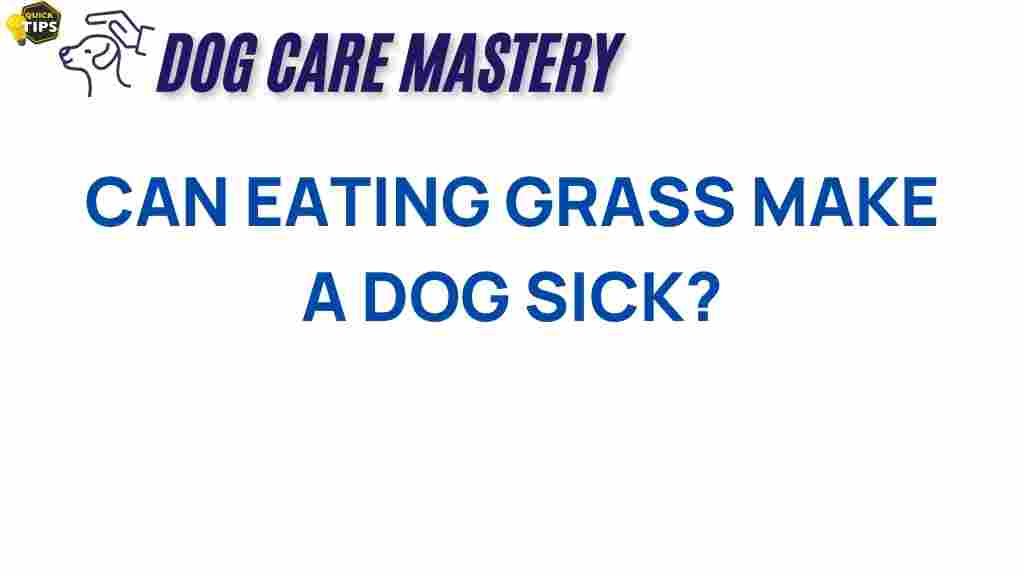The Surprising Truth: Can Eating Grass Make Your Dog Sick? – Dog Health
As pet owners, we often find ourselves puzzled by our dogs’ behaviors. One of the most intriguing habits is their tendency to munch on grass. While it may seem harmless, many of us wonder: can eating grass make your dog sick? This article delves into this question, exploring the implications for your dog’s health and providing guidance on how to manage this behavior.
Understanding the Behavior: Why Do Dogs Eat Grass?
Before we can determine whether eating grass poses a threat to dog health, it’s essential to understand why dogs engage in this behavior. Here are some common reasons:
- Instinctual Behavior: Dogs are descendants of wolves, who often consumed plant matter in their diets.
- Dietary Deficiency: Some dogs may eat grass to compensate for a lack of fiber or other nutrients.
- Upset Stomach: Many dogs seem to eat grass when they feel nauseous; it may induce vomiting to relieve discomfort.
- Boredom or Anxiety: Dogs may graze on grass as a way to relieve stress or boredom.
Can Eating Grass Make Your Dog Sick? The Risks Explained
Now that we understand why dogs eat grass, it’s time to address the crux of the matter: does this habit pose any risks to dog health?
Potential Health Risks
While many dogs seem to eat grass without any adverse effects, there are certain risks associated with this behavior:
- Pesticides and Herbicides: Grass treated with chemicals can be harmful. Always check your lawn care products.
- Foreign Objects: Dogs might swallow pieces of grass that can cause blockages in their digestive tract.
- Gastrointestinal Upset: Ingesting too much grass can lead to vomiting or diarrhea.
- Allergic Reactions: Some dogs may be allergic to specific types of grass.
Signs That Your Dog May Be Sick After Eating Grass
If you notice your dog eating grass frequently, pay attention to their health. Here are signs that may indicate a problem:
- Vomiting or excessive drooling
- Lethargy or unusual behavior
- Diarrhea or changes in stool consistency
- Refusal to eat or drink
Steps to Ensure Your Dog’s Health When Eating Grass
If you’re concerned about your dog’s grass-eating habits, there are steps you can take to safeguard their health:
1. Monitor Your Dog
Keep an eye on your dog when they are outside. If they begin to graze, observe whether they show any signs of distress afterward.
2. Choose a Safe Environment
Ensure that your dog has access to clean, untreated grass. Avoid areas that may have been treated with chemicals.
3. Provide a Balanced Diet
A well-balanced diet can help meet your dog’s nutritional needs. Consult your veterinarian about the best food options for your dog.
4. Offer Alternatives
If your dog enjoys chewing on grass, consider providing them with appropriate chew toys or safe greens, such as:
- Carrots
- Green beans
- Commercially available dog-safe greens
5. Consult Your Veterinarian
If your dog’s grass-eating behavior changes suddenly or if they exhibit any concerning symptoms, it’s crucial to consult your veterinarian. They can provide you with tailored advice based on your dog’s health history.
Troubleshooting: What to Do If Your Dog Gets Sick After Eating Grass
If you find that your dog has become sick after eating grass, take the following steps:
1. Assess the Situation
Evaluate your dog’s symptoms. Are they vomiting? Do they seem lethargic? Understanding the severity of the situation will help you decide on the next steps.
2. Keep Them Hydrated
Ensure your dog has access to fresh water. Hydration is crucial, especially if they are vomiting or have diarrhea.
3. Monitor Their Condition
If your dog shows signs of improvement, continue to monitor them closely. However, if symptoms persist for more than 24 hours, it’s time to seek veterinary care.
4. Avoid Home Remedies Without Consultation
While many pet owners may suggest home remedies, it’s essential to consult a veterinarian before administering any treatment to your dog.
Conclusion: Balancing Grass Eating and Dog Health
In conclusion, while many dogs enjoy eating grass and can do so without becoming sick, it’s essential to be vigilant about the potential risks involved. By understanding your dog’s behavior and taking appropriate precautions, you can help ensure their health and well-being.
If you’re looking for more information on maintaining your dog’s health, consider checking out our comprehensive guide on dog nutrition and wellness.
For external resources on pet health, visit the American Kennel Club, which offers valuable insights and guidance for dog owners.
Ultimately, being proactive and informed is the best way to support your dog’s health and happiness. Remember, if you ever have concerns about your dog’s behavior or well-being, don’t hesitate to reach out to your veterinarian for advice.
This article is in the category Health and created by dogcaremastery Team
